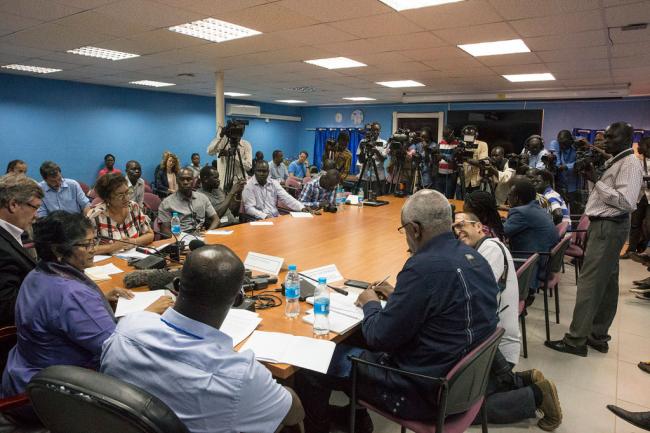
“We are deeply concerned at the slow progress on the implementation of the provisions of the Peace Agreement which is fundamental to ending the conflict, human rights violations and normalization of the lives of South Sudanese,” Yasmin Sooka, the Chairperson of the UN Commission on Human Rights in South Sudan, told reporters in the country’s capital, Juba.
The Commission was established in March this year by the Geneva-based UN Human Rights Council and comprises two other members Kenneth Scott and Godfrey Musila. The Commission has been tasked with, among other mandates, monitoring and reporting on the situation of human rights in South Sudan and make recommendations for its improvement.
According to a press release, the three Commission members travelled throughout the country from 8 to 15 September, holding exchanges with Government officials, the judiciary, the legislative Assembly, the diplomatic corps, UN actors, civil society organizations and internally displaced persons (IDPs) taking shelter at the UN Mission in South Sudan (UNMISS) Protection of Civilians sites (PoC).
In early July, close to the fifth anniversary of the country’s independence, the youngest nation in the world was plunged into fresh violence due to clashes between rival forces – the Sudan People's Liberation Army (SPLA), loyal to President Kiir, and the SPLA in Opposition, backing former First Vice-President Riek Machar. That led to deaths and injuries and a mass displacement of civilians, also undermining the implementation of the peace agreement between the political rivals in August 2015, which formally ended their differences.
“We travelled to Bentiu and made a stop in Malakal. The visit proved to be extremely useful as we were able to visit the Malakal UNMISS PoC site housing IDPs and obtained an extensive briefing on the human rights situation there,” Sooka said.
The Commission observed the deplorable conditions under which IDPs live. Unfortunately, it could not visit the PoC site in Juba for security reasons, but held a meeting with the site’s leadership on the human rights situation and the violations and abuses reportedly committed in Juba. The Commission also held two meetings with women in the PoC sites where they were able to hear directly from women on the human rights situation and the human rights violations and abuses they had suffered, including gang rape by armed men in uniform.
In meetings with Government officials, the Commission members touched on critical issues of accountability, particularly in respect of previous and current investigations and inquiries that the government has either conducted, instituted or committed to, the press release said, noting that these issues included the establishment of the Hybrid Court for South Sudan, the Bill amending the Penal Code to incorporate international crimes and the establishment of the Commission for Truth, Reconciliation and Healing.
“Overall, we remain concerned by the diminishing space for journalists and civil society members who are subject to intimidation and harassment; by the lack of access for UNMISS and humanitarian actors to reach the most vulnerable; the escalation of sexual violence against women and girls,” said Scott.
“Above all, we are concerned about the ongoing impunity and lack of accountability for serious crimes and human rights violations in South Sudan, without which lasting peace cannot be achieved,” he added.
The three members are currently in Addis Ababa for meetings with high-level officials from the African Union, the Intergovernmental Authority on Development, and the Joint Monitoring and Evaluation Commission and will later travel to Uganda to interact with South Sudanese refugees and for further meetings in connection with their mandate.
The Commission plans to return to South Sudan later this year before reporting to the Human Rights Council in March 2017.
The members of the UN Security Council also visited the country earlier this month.
Photo: UNMISS/Isaac Billy
Source: www.justearthnews.com
Support Our Journalism
We cannot do without you.. your contribution supports unbiased journalism
IBNS is not driven by any ism- not wokeism, not racism, not skewed secularism, not hyper right-wing or left liberal ideals, nor by any hardline religious beliefs or hyper nationalism. We want to serve you good old objective news, as they are. We do not judge or preach. We let people decide for themselves. We only try to present factual and well-sourced news.







